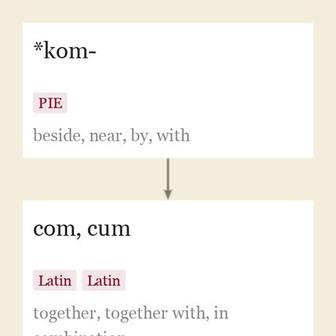con-
word-forming element meaning "
Entries linking to con-

word-forming element usually meaning "
Before vowels and aspirates, it is reduced to co-; before -g-, it is assimilated to cog- or con-; before -l-, assimilated to col-; before -r-, assimilated to cor-; before -c-, -d-, -j-, -n-, -q-, -s-, -t-, and -v-, it is assimilated to con-, which was so frequent that it often was used as the normal form.
in Latin, the form of com- "
updated on February 17, 2018